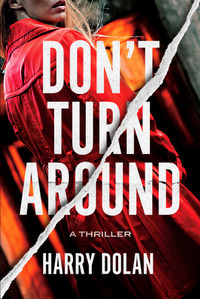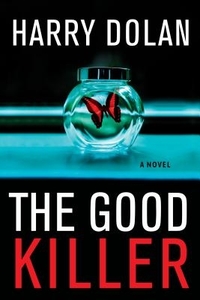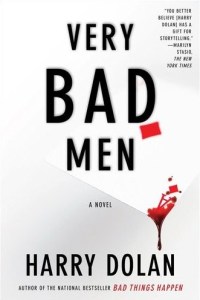Don't Turn Around by Harry Dolan
 Monday, April 1, 2024 at 7:31AM
Monday, April 1, 2024 at 7:31AM 
Published by Atlantic Monthly Press on April 2, 2024
Eleven-year-old Kate Summerlin snuck out of her bedroom window at night, took a stroll in the woods, and came upon the body of a young woman named Melissa. Her killer had written the work Merkury on her body. The killer had planned to hang Melissa's body in a tree, but Kate came along while he was retrieving the rope. He told her not to turn around. Then they had a little chat that Kate has always kept to herself. The reader won’t learn the full details of that encounter until the final pages. I’m not sure it is worth the wait.
Kate is now in her late 20s. She supports herself by writing true crime stories. Merkury went on to become a serial killer. He has racked up nearly a dozen victims when the story resumes.
As an adult, Kate’s a bit of a mess. She likes to have rough sex, but only when she is the rough one. The guy needs to be gentle and follow her instructions. Unfortunately, that’s the only character trait that makes Kate interesting, and she doesn’t have enough sex to sustain a reader’s interest in her kinkiness.
Kate is now living rent-free at a relative’s home in rural Ohio. She receives a visit from Vera Landen from Alexander, New York, where Kate lived with her father when she found the body. Vera bothers Kate periodically, hoping she will reveal a new detail that will help her catch Merkury. This time she tells Kate that Merkury, who has killed people across the country, has returned to Alexander.
Bryan Cayhill’s body was found by a film student, Lavana Khatri, as well as two other students who were helping her make an extremely low-budget horror film. Kate’s agent convinces her that her career as a true-crime writer isn’t going anywhere and that she can only give it a boost by writing about Merkury. Kate returns to Alexander, where she plans to interview the students who found Bryan’s body. Lee Tennick, who has a true-crime podcast, is there ahead of her.
Clay McKellar, one of the actors who found the body, seems to be freaked out by the experience. Tennick befriends Clay, perhaps to induce Clay to appear on his podcast, but becomes concerned when Clay disappears. Did Merkury do away with him?
Shortly after Kate arrives in town, Sam Wyler asks her to look into the disappearance of his 19-year-old daughter Jenny. Since Kate isn’t a detective, the request makes little sense (neither does Kate’s agreement to investigate), but Harry Dolan needed to send the story in a new direction so there you have it. Perhaps Jenny ran away from her controlling father and, if so, she should have done it when she turned 18, but perhaps she’s been abducted, car and all. Naturally, Jenny’s disappearance will connect with one of the murders because that’s how crime novels work.
Who is Merkury? Could it be Sam Wyler? Could it be Devin Falko, a therapist who turned up at Kate’s book signing and became her on-again, off-again lover? Could it be Lee Tennick? Could it be Travis Pollard, a seemingly creepy guy who played the killer in Lavana’s movie? Could it be Kate’s father? More death ensues before the reader’s questions are answered. A bit more than midway into the novel, Kate kills someone, more or less in self-defense, and learns how it feels to form the intent to take a human life. It doesn’t seem to bother her much.
When the puzzle seems to be solved with a hundred pages remaining, the reader knows that the solution is either partial or false. The unfolding truth becomes a bit convoluted and is not remotely credible — Kate knows a shocking number of people who harbor a murderous intent — but such is the way of the modern thriller. Implausible stories might still be enjoyable, but I never warmed up to Kate and the other characters tend to be lifeless, even before they’re murdered.
Most of the story proceeds at a steady pace, although it drags a bit as it nears its final revelation. The story ends with some decent action scenes. They aren’t particularly suspenseful, but Dolan at least makes an effort to satisfy the thriller reader’s appetite for thrills. A couple of suspense-building tricks are cheesy — someone we think is dead miraculously turns out to be not dead — but some readers find dramatic cheese to be tasty. The story hinges on a final reveal, the big mystery that defines Kate’s life. That plot detail is too contrived for my taste but again, some mystery fans might think it is sufficiently shocking to make it worth the wait.
I’ve enjoyed other Dolan novels more than this one, but the story does just enough to earn a recommendation for mystery fans who have finished all the top-shelf novels on their reading list. On a five-star system, I would give it 3.5, a half star above a Recommended with Reservations rating.
RECOMMENDED

